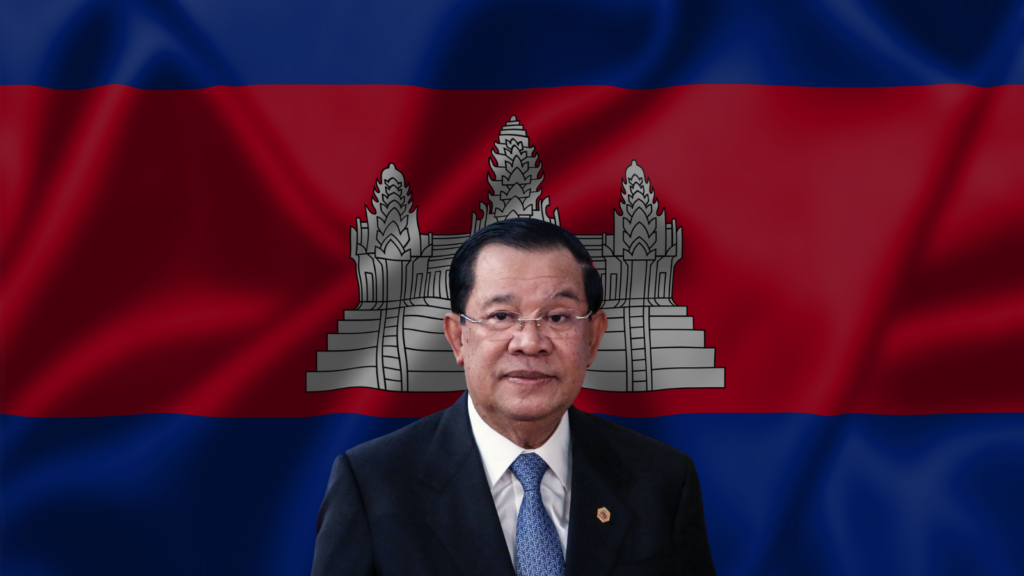What does the Cambodian Senate presidency mean to a ruler who is already all powerful?
Every politician, especially one whose chokehold over a country lasted nearly four decades, needs some time off. Hun Sen, who handed over the prime ministership of Cambodia to his eldest son last summer, has had his feet up for the past seven months.
Not that he’s been idle; he’s still president of the ruling party and head of the King’s Privy Council, and has occasionally intervened to publicly chide his son for some mistakes. But after the Senate elections on Feb. 25, he’ll be coronated as the new Senate president.
The position will make him acting head of state when King Norodom Sihamoni is out of the country, as he often is for health checkups in China. With Cambodia now a Hun family fiefdom, you’ll have Prime Minister Hun Manet as head of government and Hun Sen as de-facto head of state.
What does it matter, you may ask, since Hun Sen is already all powerful? But the question contains the answer.
Clearly, Hun Sen doesn’t think of himself that way or else why would he want the Senate presidency? Indeed, he stated on the day that he resigned as prime minister last July that he would become Senate president, so clearly this had been decided when the ruling party was crossing the T’s on its vast succession plan in 2021 and 2022.
Moreover, it’s not a risk-free move. It means the current Senate president, Say Chhum, has to retire. This has the added benefit of pensioning off another graying ruling party grandee and one who some think controls a rival faction within the party. Say Chhum had agreed to resign last year, perhaps safe in the knowledge that his family’s patronage networks are now in the hands of his son Say Sam Al, the land management minister.
But for those in the party (and there are some) angry that the CPP has become a family-run affair, the Hun duo as heads of government and state won’t sit well. Hun Sen stated last July during his resignation speech that by becoming Senate president, “I will not intrude into the responsibilities of the new prime minister,” but it certainly appears that may to some.
Moreover, it seemingly goes against the spirit of the party’s generational succession scheme in which the aging “first generation” CPP leaders (Hun Sen included) were supposed to retire from frontline politics and give formal powers to the “second generation”, even if the elders still called the shots behind the scenes. So why not give the Senate presidency to a younger, “second generation” politician?
Given that the CPP took years to meticulously plot this succession process – so it cannot be that they were stuck in making a decision about who would become Senate president and Hun Sen was the easiest option to fill the void – the only logical conclusion is that Hun Sen wants the Senate presidency because he thinks he needs it. First, it will allow him to travel abroad on state visits or welcome visiting leaders in an official capacity, which he hasn’t been able to do since August.
Despite having been the world’s longest-serving head of government, he never gained acceptance as a world’s statesman, certainly not one spoken of with the same reverence as Lee Kwan Yew of Singapore. The Senate presidency might give him another decade or so to attempt to claim such a mantle.
Second, according to some, it gives him official diplomatic immunity, which may come in handy at some point in the future. Third, and while one ordinarily ought to avoid psychoanalyzing politicians, it’s probable that Hun Sen detests being away from frontline politics and not being able to make public displays of his power, so maybe it’s the case that he is taking the Senate presidency simply because he can.
Institutional capture
Now 71, he has been a senior politician since the age of 27, and he never seemed the type to enjoy retirement nor to shy away from publicity. Hun Sen is never happier than when delivering a three-hour monologue to a crowd of bussed-in workers. But he’s had few opportunities to do so since August, although that’s partly because he has wanted to give his son the limelight. As Senate president, he will have a captive audience (in more ways than one) again.
Fourth, and perhaps most importantly, the Senate presidency gives him yet more institutional power to intervene if something was to go wrong with his son’s government – or, indeed, if there was ever a putschist attempt against Hun Manet.
Remember that Hun Sen has repeatedly said he would return as prime minister if any major crisis befouled the government; the insinuation being that his vacation from the premiership may be temporary. For the best part of a decade, the Hun family has been on a long march through the institutions, wary that some of its rivals may also be on their own such project.
Today, he has the King’s ear as head of the Supreme Privy Advisory Council. He controls the powerful but unruly (and quick to disgruntlement) business tycoons, the oknha, as president of the newly-formed Cambodian Oknha Association.
He’s also president of some other CPP-linked “uncivil society” groups. Through constitutional reforms in 2022, he greatly weakened the power of the National Assembly to reprimand ministers or the prime minister, and in 2023 he helped make the loyal but politically weak Khuon Sudary the new president of the lower chamber of parliament. These steps gave even more power to the CPP over personnel choices.
He has vowed to remain CPP president potentially for life and Hun Manet was made the fifth vice-president in December. He has packed the ranks of deputy prime ministers with loyalists. In fact, his youngest son, Hun Many, was made the eleventh deputy prime minister this month. His family cemented its control over the army.
Hun Manet was previously army chief, a post that went to Hun Sen’s trusted and infamous bodyguard Mao Sophan last year. Hun Manith, another of his sons and head of military intelligence, was made deputy army chief at the same time.
Whereas the Huns control the army, the Tea clan – the patriarchy of former defense minister Tea Banh, who handed down power to his son Tea Seiha last year – controls the navy.
So, taking over the Senate is another institutional capture for the Hun family, giving added protection to the Hun Manet administration should there be signs of unrest amongst CPP parliamentarians or, if Manet decides at some point to allow an opposition party to compete in elections, from opposition lawmakers.
Given that senators have a six-year term, he may remain president of the upper house until 2030, when he will be 77. But, then again, he has long said his ideal retirement age will be 74. Perhaps he will never step aside.
The article was originally published by Radio Free Asia.







